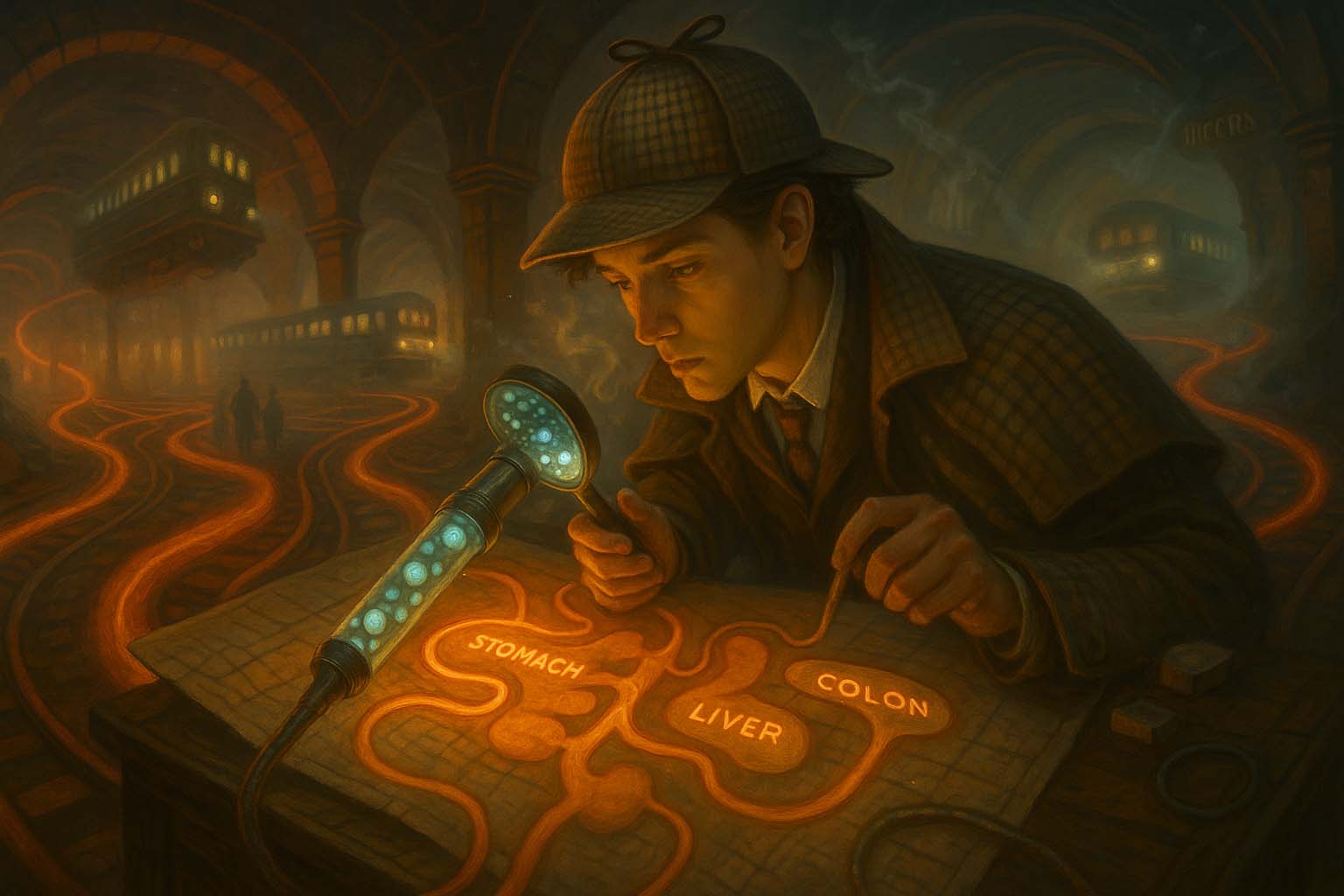
Gastroenterology
- Posted by admin
- Categories Organ & Systems Medicine
- Date May 23, 2025
- Comments 0 comment
The Gut Detective’s Domain – Cracking the Cases of Digestion, Discomfort, and Hidden Depths
1. Introduction: The Scene of the Specialty
Step into the shoes of a Gastroenterology sleuth.
This is the long and winding trail from mouth to anus—a digestive odyssey rich in signs, symptoms, and secrets. Gastroenterologists investigate a realm where pain can masquerade as hunger, and bleeding may be slow, silent, or sudden. They listen to bowels, peer through scopes, and decipher the language of enzymes and inflammation. Welcome to a world where a burp may be benign or a bombshell, and every abdominal complaint is a story waiting to be scoped.
2. Key Mysteries They Solve (Common Conditions)
These detectives specialise in solving cases involving:
- Gastroesophageal Reflux & Dyspepsia – the classic complaints with diagnostic depth.
- Inflammatory Bowel Disease (IBD) – chronic, relapsing puzzles of immune misfire.
- Irritable Bowel Syndrome (IBS) – a functional riddle with psychological echoes.
- Liver Disease & Hepatitis – hidden dysfunctions in the body’s metabolic hub.
Each case requires more than a gut feeling—it demands pattern recognition across pain, bowel habit, and biochemistry.
3. Their Trusted Tools & Techniques
Every detective has their kit—and in Gastroenterology, tools may include:
- Endoscopy & Colonoscopy – eyes into the tunnels where trouble hides.
- Liver Function Tests & Enzyme Panels – chemistry’s clues to inflammation, obstruction, or failure.
- Ultrasound, CT, and MRCP – scanning ducts, gallstones, and hepatic secrets.
- Stool Analysis & Breath Tests – subtle signs from what the body excretes or digests.
Gastroenterologists rely equally on technology, touch, and tenacity.
4. The Charms of This Field: Why It Captivates the Curious
- Direct Visual Diagnosis: Few specialties allow you to see pathology so vividly.
- Procedural Variety: Scoping, banding, injecting, biopsying—it’s hands-on detective work.
- Mind-Gut Connections: Functional and psychological overlaps bring depth and nuance.
- Continuity and Cure: Chronic conditions managed long-term; some mysteries cured within a day.
This is a specialty where gut instinct meets guided intervention.
5. Challenges: The Toughest Cases They Face
- Non-Specific Symptoms – Bloating, pain, and nausea can point in many directions.
- Patient Embarrassment – Shame around bowel habits can delay key clues.
- Relapsing-Remitting Conditions – IBD and liver disease require nuanced, long-term care.
- End-of-Life Complications – Advanced liver failure or GI cancers come with heavy conversations.
But the seasoned GI detective knows: when treated with dignity, even the most taboo clues speak volumes.
6. Famous Cases and Hallmark Clues
- The “Classic Presentation” – Bright red blood per rectum after straining: haemorrhoids or anal fissure.
- The “Zebra” – A young woman with diarrhoea, mouth ulcers, and weight loss: Crohn’s disease.
- The “Aha Moment” – Identifying coeliac disease in an adult with vague fatigue and iron-deficiency anaemia.
7. Your Training Trail: How to Join the Investigation
To become a Gastroenterology detective:
- Train in internal medicine with a strong focus on systemic thinking and abdominal examination.
- Learn to master endoscopy—not just technically, but interpretively.
- Study nutrition, microbiota, hepatology, and immunology in equal measure.
- Practise delicate communication—this is a field where patients share vulnerabilities.
Whether managing a cirrhotic crisis or a simple polyp removal, you’ll be helping restore the flow of health through the body’s central corridor.
8. Final Words: The Signature of the Gastroenterology Detective
Gastroenterology detectives listen to the body’s deepest churnings.
They track pain, trace blood, and restore flow—be it of bile, energy, or self-confidence.
They don’t just scope problems—they frame them with care, interpreting the signs that others ignore.
So if you’re drawn to visceral truth, vivid images, and cases that demand courage and precision—
then this is your digestive journey to follow.



